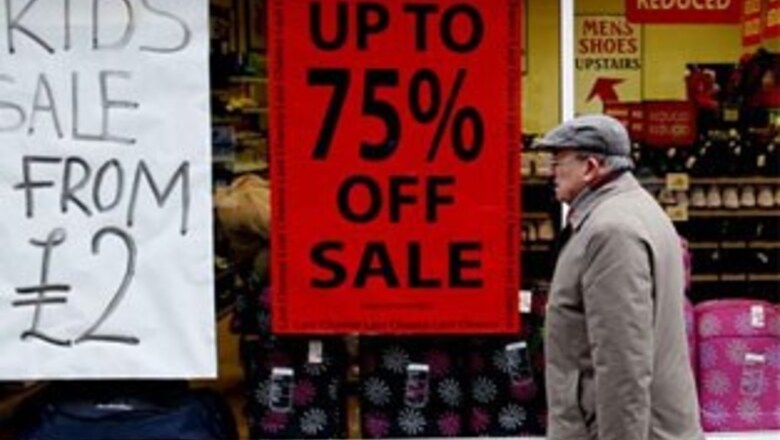
views
London: World markets fell on Friday as investors were disheartened by weak corporate and economic figures and confirmation that Britain plunged into recession at the end of last year.
The past 24 hours have seen Microsoft announce its first mass layoffs in its 34-year history.
Samsung report its first ever quarterly loss and the US report more weak unemployment and housing figures. And as investors came to their desks Friday morning, official data showed Britain's economy shrank 1.5 per cent in the fourth quarter — the sharpest quarterly downturn since the early days of Margaret Thatcher's government almost 30 years ago.
Wall Street staged another big retreat Friday, extending a 3.5 per cent drop in the Dow Jones industrial average on Thursday.
The index was down 145 points, or 1.8 per cent, at 7977.76 in early morning trade in New York.
The Standard & Poor's 500 index was down 1.43 per cent and the Nasdaq composite index fell 0.77 per cent.
Dow component General Electric Co reported fourth-quarter profits Friday morning that were in line with analysts expectations but at the bottom end of the company's guidance. Its shares fell 4.5 per cent, further weighing on sentiment.
Copier and printer maker Xerox Corp said profits fell to $1 million for the three months ended December 31, from year-ago profit of $382 million.
Its stock slumped 14.8 per cent. European markets were also lower, spooked by news the British economy had officially slid into recession.
Britain's benchmark FTSE 100 index fell 0.97 per cent to 4013.11 in afternoon European trading. Other indexes fared worse, with Germany's DAX down 1.91 per cent at 4,138.77 and France's CAC 40 shedding 2.27 per cent at 2,804.56.
Analysts said the sharp deterioration in stock markets reveals an increasingly pessimistic outlook for the year ahead, with bad economic news coming thick and fast from all corners of the globe. That is pushing investors to drop riskier equities in favor of lower risk government bonds, or gold.
"The race to the bottom amid G-7 economies speeds up the risk-reduction trades as macroeconomic data pushes superlatives to higher levels," said Ashraf Laidi, chief market strategist at CMC Markets.
The fall in British economic output, for example, was worse than the market expected and surprised with sharp drops in industrial production and services.
"Clearly this sets a very weak platform for GDP growth this year and suggests that our forecast for a 2.5 per cent drop could be too optimistic," said Vicky Redwood, analyst at Capital Economics in London.
Europe's losses followed even sharper drops in Asia, where Japan's Nikkei 225 dropped 3.8 per cent to 7,745.25, while Hong Kong's Hang Seng Index eased 0.6 per cent to 12,578.60 and South Korea's Kospi sank 2.1 per cent to 1,093.40.
Both financial and technology stocks were under pressure on fears a deeper global downturn would continue to weigh on corporate earnings.
Barclays stock was down 15.7 per cent in London on worries it may require a bailout from the British government in a plan which may mean part-nationalization.
Auto companies also saw steep falls, with BMW down 4.9 per cent in Frankfurt, while chip maker Infineon AG fell 7.7 per cent after its unit Qimonda declared bankruptcy.
"Profit concerns continue to intensify, with consensus estimates now looking for an overall fall of around 28 per cent in Q4 earnings in the S&P 500," said Mitul Kotecha at Calyon in London.
Investors were stunned overnight by news software giant Microsoft Corp was slashing 5,000 jobs and had suffered an 11 per cent drop in profit last quarter. Upbeat earnings by Google Inc. did little to alleviate investors' sour mood.
The gloom was echoed in Thursday's US economic data, which showed construction of new homes and apartments slid 15.5 per cent in December, closing out the worst year for builders since at least 1959. Meanwhile, first-time applications for unemployment benefits jumped last week to 589,000, the most since 1982.
Things were similarly bleak across Asia, where Japan's Sony Corp. projected its first annual net loss in 14 years and announced job cuts.
In South Korea, Samsung Electronics, the world's largest manufacturer of flat-screen televisions and memory chips, posted its first ever quarterly loss Friday as the slowdown hit prices.
Shares of Sony tumbled 7 per cent to their lowest level in a month.
Nippon Steel Corp., Japan's biggest steelmaker, lost 5 percent after saying it would cut production by the largest amount in its four-decade history as auto demand gets squelched by the global slowdown.
"I don't see any signs of revival in the economy this year, definitely not," said Peter Lai, investment manager at DBS Vickers in Hong Kong.
"There are too many uncertainties, too much negative news. I don't think the worst is over."
Oil prices were lower, with light, sweet crude for March delivery falling $2.00 to $41.67 a barrel in European trade. The contract rose overnight 12 cents settle at $43.67.



















Comments
0 comment